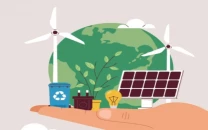Wheat surplus: Ministry seeks 50% regulatory duty on imports
ECC likely to take up the proposal in upcoming meeting

Minister of states and frontier regions says all refugees will return to their home countries by December 31
“A summary has been sent to the Economic Coordination Committee (ECC) for formal approval,” said a senior officer of the ministry while talking to The Express Tribune.
Previously, there was 25% regulatory duty on the import of wheat, which was recently increased to 40% on the recommendation of the ministry. Now, it has been recommended to further increase the duty to 50% so that wheat import could be discouraged.
“There is a possibility that the ECC will approve the proposal in its upcoming meeting, which will be helpful in limiting or stopping the import of wheat,” said the officer.
The step has been taken on the recommendation of provinces, particularly Sindh, which has been the victim of substandard wheat imports in the current year despite presence of a high-quality commodity produced in the country.
Read: Wheat export: Punjab, Sindh want subsidy deadline extended
The official also said in the international market, wheat prices were lower compared to the rates in Pakistan and traders were importing the commodity from different countries to sell it in the local market at cheaper prices.
The officer said the practice had not only greatly damaged the interest of wheat growers, but also created problems in its storage. “A huge quantity of surplus stock from the previous year is already stored in the country and another bumper crop has started hitting the market.”
Under the World Trade Organisation (WTO) regime, no country can impose a ban on the import of any commodity in an open competitive market, therefore, regulatory duty is the sole option available to discourage the import of a commodity.
Read: ECC approves 85,000 metric tonnes of wheat for TDPs
Last Friday, the ECC also extended the deadline until July 31 for the subsidy on wheat exports, which had ended on May 15.
In January this year, the ECC had given approval for the export of 1.2 million tons of surplus wheat with a subsidy of $45 per ton for Sindh and $55 per ton for Punjab for four months.
However, despite the subsidy, wheat could not be exported in a big way and only around 200,000 tons have so far been shipped.
“This is another attempt to dispose of the surplus commodity,” said another officer in the ministry.
Published in The Express Tribune, June 23rd, 2015.
Like Business on Facebook, follow @TribuneBiz on Twitter to stay informed and join in the conversation.


















COMMENTS
Comments are moderated and generally will be posted if they are on-topic and not abusive.
For more information, please see our Comments FAQ